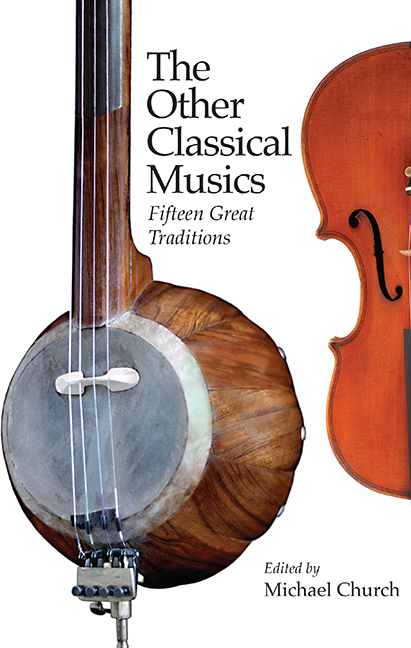Book contents
- Frontmatter
- Dedication
- Contents
- List of Illustrations
- List of Contributors
- Preface and Acknowledgements
- Introduction
- Maps
- 1 Thailand, Laos, Cambodia, Vietnam
- 2 Java
- 3 Japan
- 4 China: The Guqin Zither
- 5 Chinese Opera
- 6 North India
- 7 South India
- 8 Mande Jaliyaa
- 9 North American Jazz
- 10 Europe
- 11 North Africa and the Eastern Mediterranean: Andalusian Music
- 12 The Eastern Arab World
- 13 Turkey
- 14 Iran
- 15 Uzbekistan and Tajikistan
- Notes
- Bibliographies
- Index
5 - Chinese Opera
Published online by Cambridge University Press: 29 May 2021
- Frontmatter
- Dedication
- Contents
- List of Illustrations
- List of Contributors
- Preface and Acknowledgements
- Introduction
- Maps
- 1 Thailand, Laos, Cambodia, Vietnam
- 2 Java
- 3 Japan
- 4 China: The Guqin Zither
- 5 Chinese Opera
- 6 North India
- 7 South India
- 8 Mande Jaliyaa
- 9 North American Jazz
- 10 Europe
- 11 North Africa and the Eastern Mediterranean: Andalusian Music
- 12 The Eastern Arab World
- 13 Turkey
- 14 Iran
- 15 Uzbekistan and Tajikistan
- Notes
- Bibliographies
- Index
Summary
The curtain opens to reveal a table flanked by two wooden chairs in front of a dark red backcloth. With two strident oboes and a mighty roar of percussion, the instrumental ensemble – out of view stage-left – announces the start of the play. A general with a long beard, high wooden shoes, brilliantly-patterned painted face and a strikingly-coloured costume that makes him look like a giant, arrives by ‘chariot’, attended by six young soldiers plus a staff of military officers. The fiddle begins a nasal riff garnished with swoops and slides which is punctuated by drum, cymbals and gongs; the general begins to sing in a declamatory manner, with broad gestures and contorted expressions to suggest anger. The brilliant clashes of the unblended instrumental sounds combined with the intensity of the singing – much of it in the upper register, to contrast with the hoarse outbursts of the rougher characters – create an exhilarating effect, as do the events of the story, which concerns two rival generals, the rougher of them fighting for a pretender to the emperor's throne. None of the actors or musicians at this opera school is over twenty, yet all are highly accomplished.
IN technologically-advanced modern urban China, why would a young teenager wish to join the archaic world of Beijing Opera? For most Chinese it is a difficult art to accept, but for some it remains irresistibly fascinating, and both in the People's Republic and among expatriate Chinese it has a small but fiercely loyal following. While neophytes may respond to its visual exoticism, connoisseurs, like Western opera buffs, will already be familiar with their favourite operas and performers, savouring every gesture and eye movement, every syllable whether spoken or sung, and every twist and turn in the stories.
English lacks a good translation for what the Chinese call xiju. Customarily we translate this as ‘opera’, but that term carries inappropriate baggage from European tradition. Calling it ‘theatre’ suggests spoken drama, and calling it ‘musical theatre’ evokes images from Gilbert and Sullivan or the Broadway musical. None conveys the essence, because Chinese xiju is an amalgam of acting, singing, acrobatics, the visual arts and theatre. Lacking an alternative, we will follow convention in calling it ‘opera’.
- Type
- Chapter
- Information
- The Other Classical MusicsFifteen Great Traditions, pp. 126 - 137Publisher: Boydell & BrewerPrint publication year: 2015



